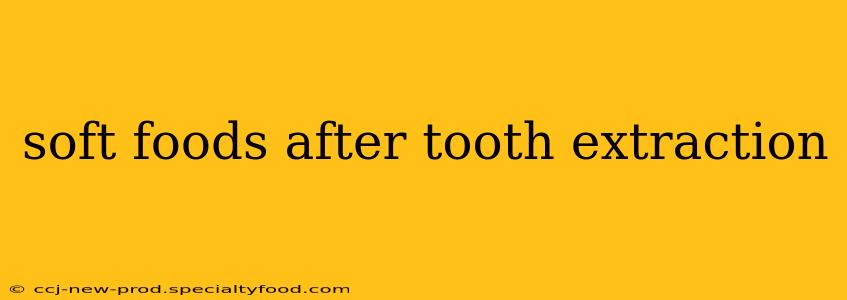Losing a tooth, whether through extraction or otherwise, can be a difficult experience. One of the immediate concerns is what to eat. The area needs time to heal, and chewing hard or crunchy foods can disrupt the blood clot forming in the extraction site, potentially leading to complications like dry socket. This guide will walk you through the best soft foods to eat after a tooth extraction, addressing common questions and concerns.
What Can I Eat After a Tooth Extraction?
The first few days after a tooth extraction are crucial for healing. Your diet should consist primarily of soft foods that require minimal chewing. Think about foods that are easily mashed, pureed, or can be eaten with a spoon. Here are some excellent options:
- Yogurt: A fantastic source of protein and calcium, essential for healing. Choose plain yogurt and add a little honey or fruit for flavor.
- Applesauce: Easy to swallow and packed with vitamins. Choose unsweetened varieties to manage sugar intake.
- Smoothies: Blend fruits, vegetables, yogurt, or protein powder for a nutritious and convenient meal replacement.
- Mashed Potatoes: A classic comfort food, providing carbohydrates for energy. Avoid adding hard chunks of vegetables or meat.
- Oatmeal: A hearty and easily digestible option, especially when cooked until very soft.
- Scrambled Eggs: A good source of protein, but make sure they're well-cooked and soft.
- Soups: Broths, pureed soups (like cream of tomato or butternut squash), and well-cooked vegetable soups are excellent choices. Avoid soups with hard chunks of vegetables or noodles.
- Pudding: A creamy and satisfying dessert option.
What Foods Should I Avoid After a Tooth Extraction?
While focusing on soft foods is key, it's equally important to know what to avoid. These foods can dislodge the blood clot, causing pain and potentially leading to a dry socket:
- Hard foods: Nuts, chips, hard candies, popcorn, and anything that requires significant chewing should be avoided.
- Crunchy foods: Avoid crackers, pretzels, and anything that could easily get lodged in the extraction site.
- Spicy foods: Spicy food can irritate the sensitive extraction site and cause pain and discomfort.
- Foods that require strong chewing: Tough meats, raw vegetables, and anything requiring excessive jaw movement should be avoided.
- Straws: The sucking action can dislodge the blood clot, increasing the risk of dry socket.
- Alcohol and smoking: These can hinder the healing process and increase the risk of infection.
How Long Should I Eat Soft Foods After Tooth Extraction?
The duration of a soft food diet depends on the complexity of the extraction and individual healing time. Most dentists recommend a soft food diet for at least the first few days, gradually reintroducing more solid foods as the healing progresses. It’s crucial to listen to your body and avoid anything that causes pain or discomfort. Typically, you can resume your normal diet within a week or two.
What if I Develop a Dry Socket?
A dry socket (alveolar osteitis) is a painful complication that can occur when the blood clot in the extraction site is dislodged. Symptoms include severe pain, a bad taste in the mouth, and a visible empty socket. If you suspect a dry socket, contact your dentist immediately. They can provide appropriate treatment to relieve the pain and promote healing.
What are some other tips for post-extraction care?
Beyond diet, proper post-extraction care is vital. This includes:
- Gently rinsing your mouth: Use a saltwater rinse several times a day to help keep the area clean.
- Applying ice packs: This can help reduce swelling and pain.
- Taking prescribed medication: Follow your dentist’s instructions carefully regarding pain relievers and antibiotics.
- Avoiding strenuous activity: Rest is essential for proper healing.
Remember, always follow your dentist's specific post-operative instructions. This guide provides general advice and shouldn't replace professional medical guidance. Maintaining a healthy soft food diet is a crucial part of the recovery process. Following these tips will help ensure a smoother and faster healing experience.
